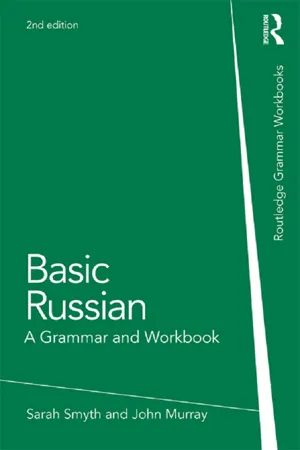
eBook - ePub
Basic Russian
A Grammar and Workbook
John Murray, Sarah Smyth
This is a test
- 384 páginas
- English
- ePUB (apto para móviles)
- Disponible en iOS y Android
eBook - ePub
Basic Russian
A Grammar and Workbook
John Murray, Sarah Smyth
Detalles del libro
Vista previa del libro
Índice
Citas
Información del libro
Designed for students with a basic knowledge of Russian, this book provides an accessible reference grammar and related exercises in a single volume.
Across more than forty grammar topics it introduces the student to Russian people and culture through the medium of the language used today, covering the core material which the student would expect to encounter in their first year of learning Russian.
Complete with a full key to exercises and glossary, Basic Russian is a user-friendly reference grammar suitable for both independent study and class use.
Preguntas frecuentes
¿Cómo cancelo mi suscripción?
¿Cómo descargo los libros?
Por el momento, todos nuestros libros ePub adaptables a dispositivos móviles se pueden descargar a través de la aplicación. La mayor parte de nuestros PDF también se puede descargar y ya estamos trabajando para que el resto también sea descargable. Obtén más información aquí.
¿En qué se diferencian los planes de precios?
Ambos planes te permiten acceder por completo a la biblioteca y a todas las funciones de Perlego. Las únicas diferencias son el precio y el período de suscripción: con el plan anual ahorrarás en torno a un 30 % en comparación con 12 meses de un plan mensual.
¿Qué es Perlego?
Somos un servicio de suscripción de libros de texto en línea que te permite acceder a toda una biblioteca en línea por menos de lo que cuesta un libro al mes. Con más de un millón de libros sobre más de 1000 categorías, ¡tenemos todo lo que necesitas! Obtén más información aquí.
¿Perlego ofrece la función de texto a voz?
Busca el símbolo de lectura en voz alta en tu próximo libro para ver si puedes escucharlo. La herramienta de lectura en voz alta lee el texto en voz alta por ti, resaltando el texto a medida que se lee. Puedes pausarla, acelerarla y ralentizarla. Obtén más información aquí.
¿Es Basic Russian un PDF/ePUB en línea?
Sí, puedes acceder a Basic Russian de John Murray, Sarah Smyth en formato PDF o ePUB, así como a otros libros populares de Languages & Linguistics y Languages. Tenemos más de un millón de libros disponibles en nuestro catálogo para que explores.
Información
PART 1
Identifying and describing people, places and objects
UNIT 1
Identifying people
Gender
(i) Nouns are classified in Russian according to three genders: masculine, feminine and neuter. The grammatical gender of a noun, which is constant, can usually be identified by its ending in the nominative case, that is, the dictionary form of the noun. In this unit we concentrate on nouns that refer to people. These are usually masculine or feminine nouns. Masculine nouns refer to men, feminine nouns to women. (See Unit 3 for nouns referencing objects and places and for the introduction of neuter nouns.)
Masculine nouns end in a consonant, a consonant followed by a soft sign (-ь) or a vowel followed by the semi-consonant (-й).
hard | consonant | музыкант | Иван |
soft | consonant + -ь | писатель | Игорь |
soft | vowel + -й | герой | Николай |
Feminine nouns end in -a, -я, -ия or -ь. Note that the ending -ь may indicate either a masculine or feminine noun.
hard | consonant + -a | балерина | Анна |
soft | consonant + -я | Катя | |
soft | consonant + -ь | Любовь | |
soft | consonant + -ия | Анастасия |
(ii) Generally speaking males are designated by masculine nouns and females by feminine nouns.
Note: There are, however, some nouns ending in -a or -я which designate males. These nouns, though they look like feminine nouns, are grammatically speaking masculine, e.g., мужчина ‘man’, дядя ‘uncle’, дедушка ‘grandfather’; a number of first names, such as Илья, Никита, Фома; and many affectionate forms of names, such as Kоля(short for Николай), Ваня (short for Иван) and Петя(short for Пётр). These nouns are qualified by masculine adjectives, e.g. хороший мужчина ‘a good man’ (see Unit 4).
‘Hard’ and ‘soft’ endings
As can be seen from the tables above some nouns have what are called ‘hard’ endings and others ‘soft’ endings. The categories of ‘hard’ and ‘soft’ refer to the quality of the final consonant as realised in the vowel that follows it.
‘Hard’ endings are represented in the written language by a consonant followed by:
• a zero ending (no ending) which in some grammar books is represented as Ø
• or one of the following vowels: -а, -у, -ы or -o
‘Soft’ endings are represented in the written language by a consonant followed by:
• a soft sign: -ь
• or one of the following vowels: -я, -ю, -и, -ё or -е
This distinction is easy to remember once you realise that Russian has two renditions of every...
Índice
Estilos de citas para Basic Russian
APA 6 Citation
Murray, J., & Smyth, S. (2013). Basic Russian (2nd ed.). Taylor and Francis. Retrieved from https://www.perlego.com/book/1615083/basic-russian-a-grammar-and-workbook-pdf (Original work published 2013)
Chicago Citation
Murray, John, and Sarah Smyth. (2013) 2013. Basic Russian. 2nd ed. Taylor and Francis. https://www.perlego.com/book/1615083/basic-russian-a-grammar-and-workbook-pdf.
Harvard Citation
Murray, J. and Smyth, S. (2013) Basic Russian. 2nd edn. Taylor and Francis. Available at: https://www.perlego.com/book/1615083/basic-russian-a-grammar-and-workbook-pdf (Accessed: 14 October 2022).
MLA 7 Citation
Murray, John, and Sarah Smyth. Basic Russian. 2nd ed. Taylor and Francis, 2013. Web. 14 Oct. 2022.